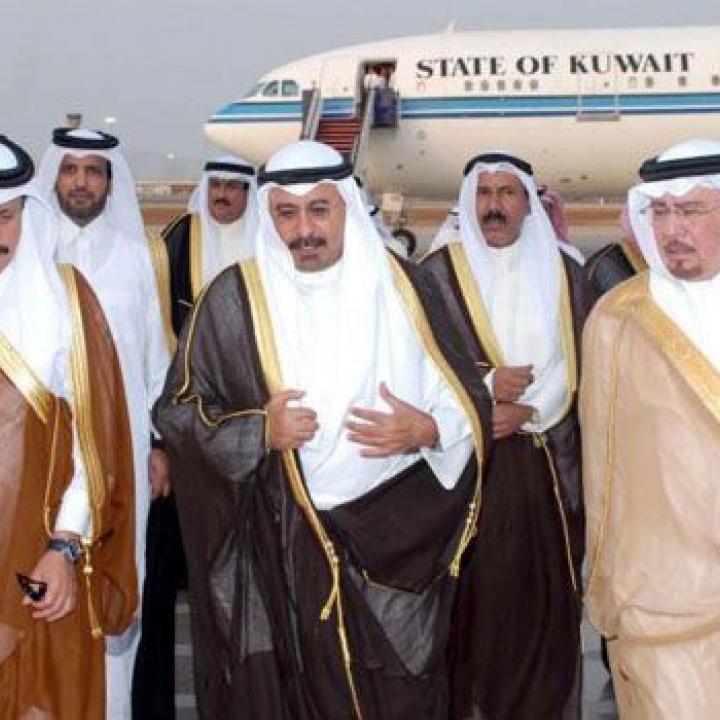

The upcoming GCC meeting in Riyadh reflects concern about events in Syria, fear of Iran, and anxieties about Washington's policies.
Normally, the leaders of Saudi Arabia, Kuwait, Bahrain, Qatar, the United Arab Emirates, and Oman meet as a group only once a year, at the Gulf Cooperation Council summit held annually in December. The May 14 talks in Riyadh are therefore being dubbed a "consultative meeting" rather than a true summit. Yet their importance is likely greater than the term indicates.
Arab diplomats suggest that Syria will top the agenda -- a symptom of both the anguish that Gulf Arabs feel at the growing number of casualties and the worsening prospects for any arranged transition to a post-Assad government, as evidenced by yesterday's attack on one of the regime's intelligence buildings in Damascus. In the vocabulary of Arab diplomacy, the Syria tragedy is being called a "key regional development in the Arab world."
In addition, GCC officials have been quoted in the Saudi English-language newspaper Arab News as saying that strained Gulf relations with Iran would also "top the agenda" at the meeting. The Gulf states have been fearful of Iran ever since the 1979 Islamic Revolution, a sentiment only worsened by Tehran's nuclear advances. Since the tumult of the recent Arab uprisings erupted throughout the region, the GCC states have largely kept their own populations content by increasing subsidies, funded by their copious oil revenues. The exceptions to this quiescence were Oman (briefly) and Shiite-majority Bahrain, where the Sunni monarchy blames continuing protests on Iranian mischief-making.
The impact of the Riyadh summit will be assessed on two criteria: which leaders attend in person, and the wording of any official statement. Infirmity is one likely reason for any absences; the desire to put diplomatic distance into any apparent consensus will be another factor.
Both Saudi Arabia and Qatar back military support of the opposition in Syria. On Iran, the Saudi view -- partly because of trouble from its own Shiite minority -- is more confrontational than that of Qatar, which shares an offshore natural gas field with Tehran. Kuwait and Oman avoid any semblance of antagonism with Iran, while the UAE, which joined Saudi Arabia in sending forces to Bahrain last year, has been concerned about Tehran's recent antics regarding three islands occupied by Iranian forces since 1971. Last month, to the GCC's horror, President Mahmoud Ahmadinejad made a high-profile visit to the main island, Abu Musa, where sovereignty is notionally shared with UAE emirate Sharjah.
A subtext of GCC concerns about Syria and Iran is that Gulf Arab leaders believe Washington's interest in democracy and freedom comes at the expense of the bigger challenge, which they judge to be Iran. They are also concerned that U.S. withdrawals from Iraq and Afghanistan presage a diminution or full withdrawal of America's presence in the Gulf. There is even a widespread belief that Washington regards Iran as its natural partner over the GCC, no matter how irrational that prospect sounds.
In fact, working with the GCC remains a vital part of the U.S. regional mission of protecting energy flows and, as evidenced by this week's uncovering of a new al-Qaeda plot against airliners, combating terrorism. Secretary of State Hillary Clinton described the U.S. commitment to the Gulf nations as unwavering while visiting the region in March. Nevertheless, the GCC apparently doubts such pledges and has renewed talk of a closer political union between member states in recent weeks. The group also invited the Arab monarchies of Morocco and Jordan to join last year.
The Riyadh meeting is therefore important to watch, despite the fact that many Arab summits are easy to dismiss as irrelevant. Washington should be concerned that it will widen Gulf Arab differences with U.S. policy rather than emphasize common interests. U.S. diplomats in the field could have a tough job countering this problem at a time when GCC leaders believe Washington is becoming distracted by the approaching presidential election.
Simon Henderson is the Baker fellow and director of the Gulf and Energy Policy Program at The Washington Institute.



